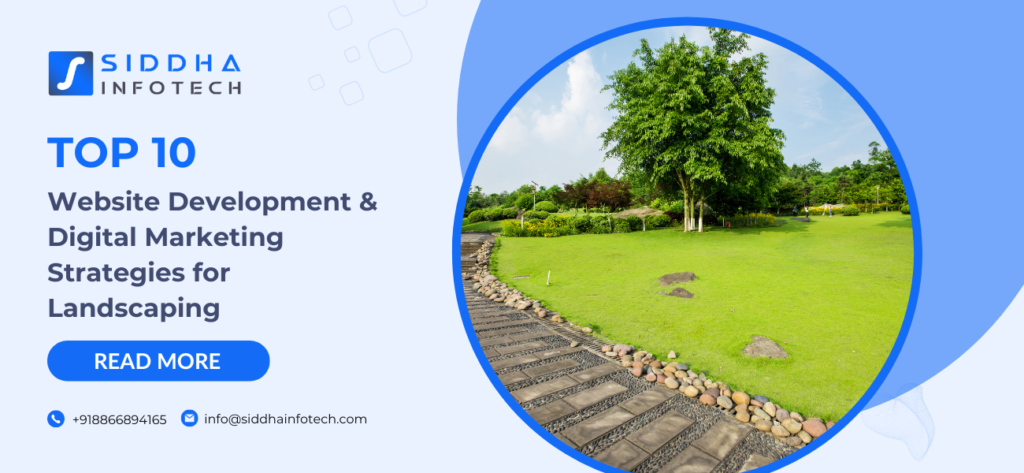10 Website Development & Digital Marketing Strategies for Landscaping
Enhance your landscaping business's online presence with Siddha Infotech's expert strategies in website development and digital marketing. From responsive web design to targeted SEO tactics, we optimize your site to attract local clients searching for landscaping services.
In the competitive field of landscaping, having a strong online presence is essential for attracting and retaining clients. Effective website development and digital marketing strategies can significantly enhance your visibility, credibility, and client acquisition efforts. Siddha Infotech presents a detailed exploration of key strategies tailored specifically for landscaping businesses.
1. Responsive Website Design
A responsive website design ensures that your site looks and functions well across all devices, including smartphones, tablets, and desktops. This adaptability is crucial as more users access websites on mobile devices. By providing a seamless browsing experience, you reduce bounce rates and increase user engagement.
2. Search Engine Optimization (SEO)
SEO is the backbone of online visibility. By optimizing your website for relevant keywords and local search terms, you improve your chances of ranking higher on search engine results pages (SERPs). Focus on local SEO to target potential clients in your service area, using location-based keywords and creating content that addresses local landscaping needs.
3. High-Quality Visual Content
In the landscaping industry, visual appeal is paramount. Utilize high-quality images and videos to showcase your portfolio of completed projects. Before-and-after photos, video walkthroughs of garden transformations, and drone footage of large-scale landscaping projects can captivate potential clients and highlight your expertise.
4. User-Experience (UX) Optimization
A well-optimized user experience can significantly impact how visitors interact with your website. Ensure intuitive navigation, fast loading times, clear calls-to-action (CTAs), and accessible contact forms. UX optimization not only improves user satisfaction but also boosts conversion rates by making it easy for visitors to inquire about your services.
5. Content Marketing Strategy
Content marketing establishes your authority in the landscaping industry while providing value to your audience. Create a blog section on your website where you publish informative articles, landscaping tips, seasonal maintenance guides, and client success stories. Regularly updated content not only engages visitors but also enhances SEO by targeting relevant keywords.
6. Social Media Engagement
Social media platforms like Instagram, Facebook, and Pinterest are powerful tools for showcasing your landscaping projects and engaging with potential clients. Share visually appealing photos and videos, participate in local community groups, and encourage satisfied clients to leave reviews. Social media engagement helps build brand awareness and fosters a community around your landscaping services.
7. Pay-Per-Click (PPC) Advertising
PPC advertising allows you to target specific demographics and geographic locations with tailored advertisements. Use platforms like Google Ads to bid on keywords related to landscaping services in your area. PPC campaigns can drive immediate traffic to your website and complement your organic SEO efforts.
8. Online Reviews and Reputation Management
Positive online reviews and testimonials can significantly influence potential clients' decisions. Encourage satisfied clients to leave reviews on platforms like Google My Business, Yelp, and Facebook. Monitor and respond to reviews promptly, addressing both positive feedback and any concerns or criticisms. A strong online reputation enhances trust and credibility in your landscaping services.
9. Email Marketing Campaigns
Email marketing remains a cost-effective way to nurture leads and retain existing clients. Build an email list through website sign-ups and client interactions. Send newsletters with seasonal landscaping tips, updates on new services or promotions, and client success stories. Personalize your emails to resonate with recipients and encourage engagement with your brand.
10. Website Analytics and Continuous Improvement
Regularly monitor website analytics to understand visitor behavior, popular content, and conversion rates. Use tools like Google Analytics to track key metrics such as traffic sources, bounce rates, and goal completions. Analyzing these data points allows you to make informed decisions and continuously improve your website and digital marketing strategies.
FAQs
How can website speed impact my landscaping business?
A fast-loading website improves user experience and reduces bounce rates, crucial for retaining visitors and converting them into clients.
Why is local SEO important for landscaping companies?
Local SEO helps your business appear in local search results, making it easier for potential clients in your area to find and contact you.
What role does social media play in marketing my landscaping services?
Social media platforms allow you to showcase your portfolio, engage with clients, and build a community around your landscaping brand.





